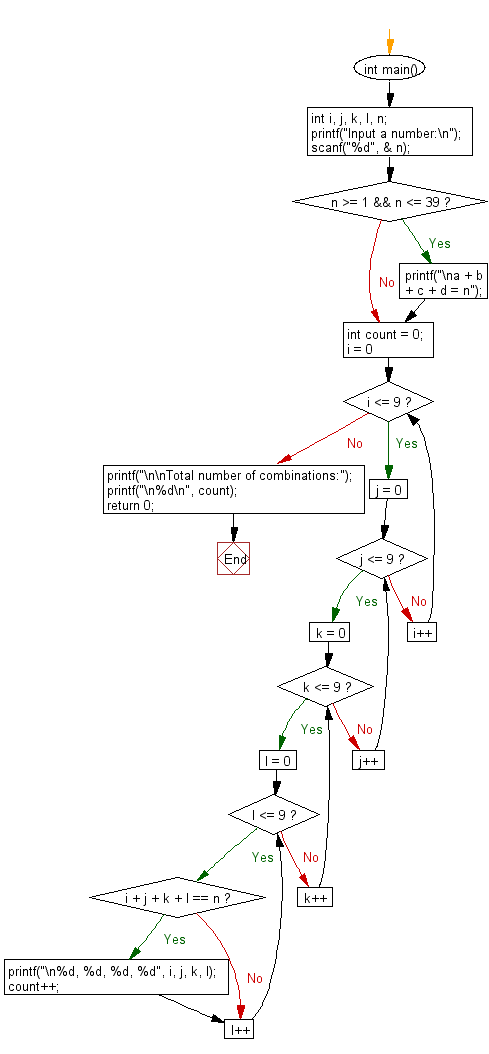C Exercises: Number of combinations of a, b, c and d (0 <= a, b, c, d <= 9) where (a + b + c + d) will be equal to n
Count combinations of four digits summing to nnn
Write a C program that reads an integer n and finds the number of combinations of a, b, c and d (0 ≤ a, b, c, d ≤ 9) where (a + b + c + d) will be equal to n.
Input:
n (1 <= n <= 50)
Sample Solution:
C Code:
#include<stdio.h>
int main() {
int i, j, k, l, n;
printf("Input a number:\n");
scanf("%d", &n);
// Check if n is within the valid range (1 to 39)
if (n >= 1 && n <= 39) {
printf("\na + b + c + d = n");
// Initialize a counter to keep track of the valid combinations
int count = 0;
// Nested loops to iterate through all possible combinations of a, b, c, and d
for (i = 0; i <= 9; i++) {
for (j = 0; j <= 9; j++) {
for (k = 0; k <= 9; k++) {
for (l = 0; l <= 9; l++) {
if (i + j + k + l == n) {
// Print the combination and increment the counter
printf("\n%d, %d, %d, %d", i, j, k, l);
count++;
}
}
}
}
}
// Print the total number of valid combinations
printf("\n\nTotal number of combinations: %d\n", count);
}
return 0; // End of the program
}
Sample Output:
Input a number: 5 a + b + c + d = n 0, 0, 0, 5 0, 0, 1, 4 0, 0, 2, 3 0, 0, 3, 2 0, 0, 4, 1 0, 0, 5, 0 0, 1, 0, 4 0, 1, 1, 3 0, 1, 2, 2 0, 1, 3, 1 0, 1, 4, 0 0, 2, 0, 3 0, 2, 1, 2 0, 2, 2, 1 0, 2, 3, 0 0, 3, 0, 2 0, 3, 1, 1 0, 3, 2, 0 0, 4, 0, 1 0, 4, 1, 0 0, 5, 0, 0 1, 0, 0, 4 1, 0, 1, 3 1, 0, 2, 2 1, 0, 3, 1 1, 0, 4, 0 1, 1, 0, 3 1, 1, 1, 2 1, 1, 2, 1 1, 1, 3, 0 1, 2, 0, 2 1, 2, 1, 1 1, 2, 2, 0 1, 3, 0, 1 1, 3, 1, 0 1, 4, 0, 0 2, 0, 0, 3 2, 0, 1, 2 2, 0, 2, 1 2, 0, 3, 0 2, 1, 0, 2 2, 1, 1, 1 2, 1, 2, 0 2, 2, 0, 1 2, 2, 1, 0 2, 3, 0, 0 3, 0, 0, 2 3, 0, 1, 1 3, 0, 2, 0 3, 1, 0, 1 3, 1, 1, 0 3, 2, 0, 0 4, 0, 0, 1 4, 0, 1, 0 4, 1, 0, 0 5, 0, 0, 0 Total number of combinations: 56
Flowchart:

For more Practice: Solve these Related Problems:
- Write a C program to iterate through all 4-digit combinations (0–9) and count those that sum to a given number n.
- Write a C program to use nested loops to generate and print all combinations of four digits whose sum equals n.
- Write a C program to compute the total number of 4-digit combinations meeting the sum criteria using recursion.
- Write a C program to store valid combinations in a 2D array and then count the number of combinations that satisfy p+q+r+s=n.
Go to:
PREV : Check if three sides form a right triangle.
NEXT : Find all prime numbers ≤n\leq n≤n.
C programming Code Editor:
Have another way to solve this solution? Contribute your code (and comments) through Disqus.
What is the difficulty level of this exercise?
Test your Programming skills with w3resource's quiz.
